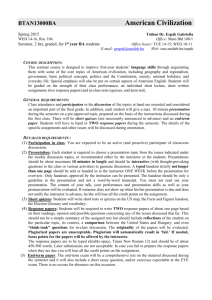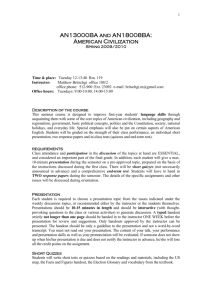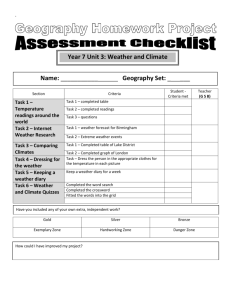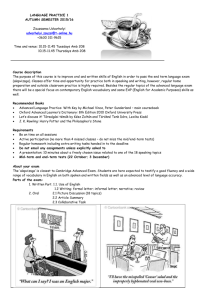American Civilization
advertisement
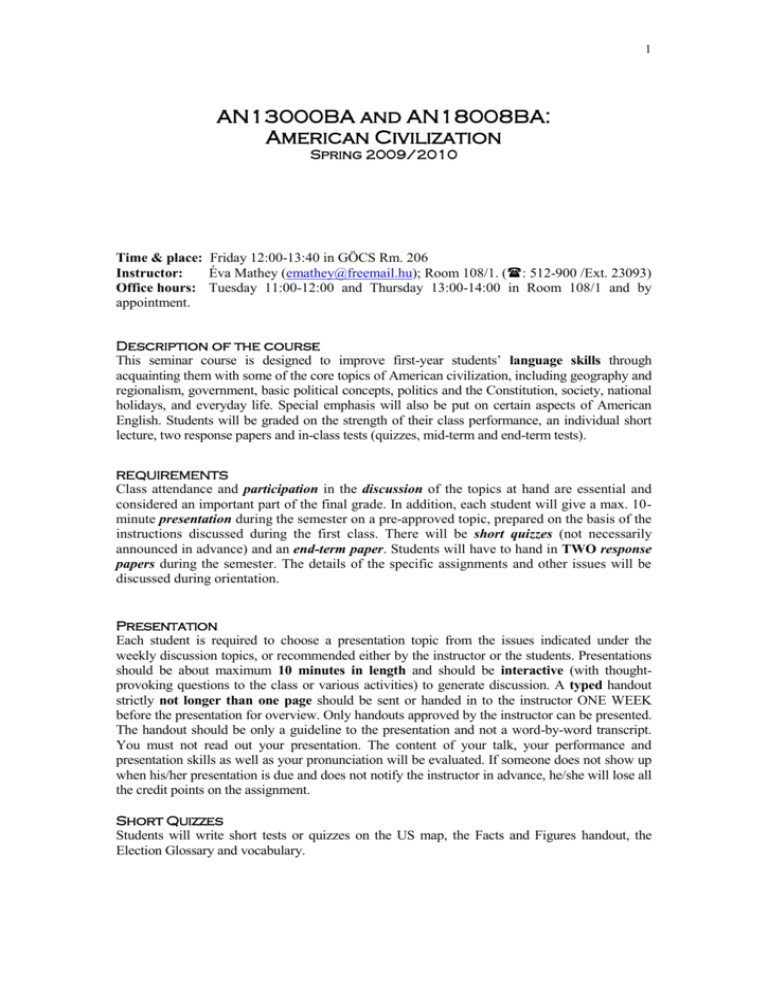
1 AN13000BA and AN18008BA: American Civilization Spring 2009/2010 Time & place: Friday 12:00-13:40 in GÖCS Rm. 206 Instructor: Éva Mathey (emathey@freemail.hu); Room 108/1. (: 512-900 /Ext. 23093) Office hours: Tuesday 11:00-12:00 and Thursday 13:00-14:00 in Room 108/1 and by appointment. Description of the course This seminar course is designed to improve first-year students’ language skills through acquainting them with some of the core topics of American civilization, including geography and regionalism, government, basic political concepts, politics and the Constitution, society, national holidays, and everyday life. Special emphasis will also be put on certain aspects of American English. Students will be graded on the strength of their class performance, an individual short lecture, two response papers and in-class tests (quizzes, mid-term and end-term tests). REQUIREMENTS Class attendance and participation in the discussion of the topics at hand are essential and considered an important part of the final grade. In addition, each student will give a max. 10minute presentation during the semester on a pre-approved topic, prepared on the basis of the instructions discussed during the first class. There will be short quizzes (not necessarily announced in advance) and an end-term paper. Students will have to hand in TWO response papers during the semester. The details of the specific assignments and other issues will be discussed during orientation. Presentation Each student is required to choose a presentation topic from the issues indicated under the weekly discussion topics, or recommended either by the instructor or the students. Presentations should be about maximum 10 minutes in length and should be interactive (with thoughtprovoking questions to the class or various activities) to generate discussion. A typed handout strictly not longer than one page should be sent or handed in to the instructor ONE WEEK before the presentation for overview. Only handouts approved by the instructor can be presented. The handout should be only a guideline to the presentation and not a word-by-word transcript. You must not read out your presentation. The content of your talk, your performance and presentation skills as well as your pronunciation will be evaluated. If someone does not show up when his/her presentation is due and does not notify the instructor in advance, he/she will lose all the credit points on the assignment. Short Quizzes Students will write short tests or quizzes on the US map, the Facts and Figures handout, the Election Glossary and vocabulary. 2 Response Papers Students will be required to write TWO response papers of about one page based on their readings, opinion and possible questions concerning the issues discussed. This should not be a simple summary of the text but should include reflections of the student on the particular topic, its context, a comparison between the United States and Hungary, and even “thinktank” questions for in-class discussion. The originality of the papers will be evaluated. Plagiarized papers are unacceptable. Plagiarism will automatically result in ‘fail.’ The response papers are to be typed (double-space, Times New Roman 12). Later submissions are intolerable. In case you fail to prepare the response papers when they are due you will lose all the credit points on the assignment. End-term Exams The end-term exam will be comprehensive tests on the material discussed during the semester and it will also include a short essay question. There is no excuse for absences on this occasion. Evaluation The final grade will be calculated from the grades assigned on class participation (25%), presentation (15%), short quizzes (20%), response papers (10%) and the end-term paper (30%). More than three absences will result in a “not fulfilled” grade. Grades will be assigned according to the following conversion formulae: 0-60% = fail; 61-70% = satisfactory; 71-80% = average; 81-90% = good; 91-100% = excellent. Further Rules It is an essential part of the course requirements to attend all class meetings. If you must miss a class because of illness or emergency, please let me know, and make arrangements to complete any work missed. Students may not miss more than three classes under any circumstances. Students are kindly requested to contact their tutor at least a day before class if they are to make a presentation but cannot attend. If you do not turn up on occasions when course assignments (presentation, quizzes) are due and you fail to notify the tutor you will lose all the credit points on the particular assignment. There is no excuse not to come to class when the mid-term and the end-term are due. Academic dishonesty or Plagiarism (failure to acknowledge and note the use of another writer’s words and ideas) is both unethical and illegal and will result in a failure of the course. Tardiness and early departures are not allowable. They are offensive to your fellow students and to the instructor because they disrupt class work. If you have a compelling reason for arriving late or leaving early, speak with your instructor about the problem. If you regularly cut the beginning and/or the end of class sessions, it can add up to unexcused full-class-time absences. Readings The basic textbook for the course is American Civilization, An Introduction (AC) by David Mauk and John Oakland (New York: Routledge, 2009). The relevant parts of textbook are available electronically at the instructor’s homepage at http://ieas.arts.unideb.hu/faculty/mathey.htm, and the whole textbook is available in the University Library. Additional materials will also be distributed in class or made available 3 digitally at the same homepage. Students are also encouraged to check other sources available at the Institute Library and on the internet, especially in connection with their presentation topics. Schedule of classes and topics Week 1 (February 12) Orientation and introduction to the course, sign-up for presentation topics Week 2 (February 19) The American Context (symbols of the country, the national anthem, the flag, the great seal of the USA, etc.) Readings: AC: pp. 10-14, Facts & Figures on the flag, anthem, capitol, mottoes; Presentation topics: the story of the US flag, national and state symbols Week 3 (February 26) The Country (American geography, cultural regions, the concept of the frontier, national parks) Readings: AC: 40-48; the US map, Facts and Figures on population & geography trivia Presentation topics: the national parks in the US, the figure of the Yankee, American English and the regional vocabulary Week 4 (March 5) Political Culture (political institutions, the Constitution and the Bill of Rights, the federal government, the system of checks and balances and the separation of powers) Readings: AC: 114-119; Presentation topics: the Bill of Rights, a brief history of the US Constitution QUIZZ on the Facts and Figures Week 5 (March 12) Elections (presidential and midterm elections, the stages of presidential elections: announcement, primaries, national convention, TV debates and campaigns, election day, electoral college, inauguration) Readings: AC: 121-125; Election Glossary Presentation topics: Barack Obama’s campaign: “Yes, We Can!” Week 6 (March 19) The people (immigration to the US, the nation of immigrants, from the melting pot to the ‘boiling pot,’ three groups in close-up: Hungarians, Chinese and Hispanics) Readings: AC: 54-55, 61-65 Presentation topics: ethnic stereotypes, the Statue of Liberty, Hungarian immigrants QUIZZ on the Election Glossary Week 7 (March 26) The people (women and ethnic minorities: Native Americans, AfricanAmericans, Hispanic-Americans, discrimination and civil rights) Readings: AC: 78-85 Presentation topics: Native Americans in US culture, the Black Civil Rights movement, Hispanic-Americans in the US 4 Week 8 (March 29-April 5) –CONSULTATION WEEK and EASTER HOLIDAY Week 9 (April 9) American values (freedom, individualism, volunteerism, patriotism and the American Dream) Readings: to be announced the previous week Presentation topics: “America, the Beautiful,” patriotism in popular culture, the American Dream THE FIRST RESPONSE PAPER IS DUE! QUIZZ on the Society vocabulary Week 10 (April 16) The legal system (the sources of US law, the system of federal and state courts, crime and punishment, death penalty, law enforcement) Readings: 208-210; 213-217 Presentation topics: crimes of the century in the US: a crime vocabulary, “Don’t dry your cat in a microwave oven!” or frivolous lawsuits in America Week 11 (April 23) Religion (Puritanism, religious plurality, American churches) Readings: 339-345 Presentation topics: the Mormons, the Amish, the Baptists QUIZZ on Crime and Legal vocabulary Week 12 (April 30) Everyday life I (sports: the big 4; technology and American culture; automobile nation; aviation; holidays) Readings: Facts and Figures on holidays, AC: 365-369 Presentation topics: baseball, American football, holidays Week 13 (May 7) Everyday life II (education: public and private, higher education; scholarships, standardized tests; the freedom of the press, media, newspapers and magazines, radio, television, popular culture) Readings: AC: 288, 294-301, 321-323 Presentation topics: the American press, the contemporary broadcasting media, Hollywood THE SECOND RESPONSE PAPER IS DUE! Week 14 (May 14) – End-term Exam Week 15 (May 21) -- Evaluation
